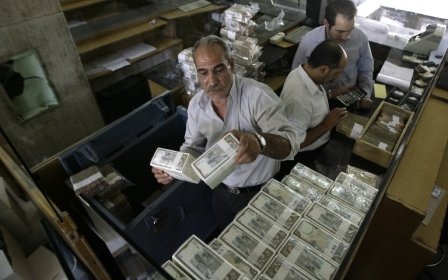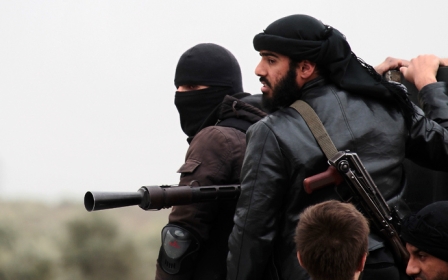At least 71 killed in Aleppo bombings, as Idlib province falls to opposition

The Syrian government on Saturday continued its bombardment of rebel controlled areas in the northern province of Aleppo, killing at least 71 people.
"The toll of the regime barrel bomb attacks on Aleppo province has risen to 71 civilians, including 59 in the city of Al-Bab and 12 in Aleppo city," said Syrian Observatory for Human Rights head Rami Abdel Rahman.
He said the bombs hit the opposition-held eastern neighbourhood of Al-Shaar, killing 12 people including eight members of a single family.
At least 33 men were killed at the Al-Hail market in Islamic State-controlled Al-Bab. The victims were all male due to the restricted freedom of movement accorded to women in IS-controlled areas.
Elsewhere the last government-controlled town in Idlib has fell to opposition forces, leaving the province almost fully in the hands of the rebels.
The Jaish al-Fateh (Army of Conquest) coalition of rebels, which includes Syrian al-Qaeda affiliate Al-Nusra Front, siezed the town of Ariha south of Idlib city, driving out forces loyal to Syrian President Bashar al-Assad and, allegedly, members of the Lebanese Shiite militia Hezbollah.
"The lightning offensive ended with a heavy pullout of regime forces and their allies Hezbollah from the western side of the city," said Abdel Rahman.
"We can't even say there were real clashes with the government in Ariha."
Government media conceded it was being overrun by the rebel onslaught on Sunday.
"Units of our armed forces evacuated their positions in Ariha and withdrew to defensive positions in the vicinity of the city after battles it fought facing large number of Nusra terrorists," said an army statement on state TV.
Abdel Rahman said that 13 government loyalists had been executed by Jaish al-Fateh inside Ariha, while another 18 were killed in fighting on the outskirts.
He said the town had fallen in “a few hours”.
The Abu Duhur military airport is still held by the government, as well as a few villages and military posts.
A 'fragile regime'
Abdurrahman Saleh, head of international media for Jaish al-Islam – a rebel group operating in Idlib – said that the province was now essentially entirely in rebel hands.
“They are in control of all of Idlib province except for two Shia villages, Kafriya and al-Fu'ah, these two villages are still besieged,” he said.
He told Middle East Eye that the victory marked a turning point in the fortunes of the Assad government.
“It's important because its shows the weaknes off the regime and how fragile it is,” he said. “Three frequent sites, Idlib, Jisr al-Shughur and Ariha, have been lost within two months. These successive losses by the regime show us how fragile it is now.”
“It can do nothing more than air attacks, it can now just maintain the areas under its control.”
He suggested that rebel forces had been encouraged by the victories and were now looking to target government strongholds.
“The next attacks may be from Idlib towards Latakia or towards Hama. Its now possible to see further possible successes by rebels,” he said. “In the past, rebels used to take some cities and then the regime would take another site – but since the beginning of the year we've seen only defeats by the regime.”
He added that the Idlib takeover was primarily down to renewed cooperation between rebel groups.
“For Jaish al-Islam, it participates in these battles, but we cannot say that one faction or one group has the credit of these victories," he told MEE. "If we talk about he ercent battles in Idlib, more than ten Free Syrian Army groups, Ahrar al-Sham, Al-Nusra Front, Jaish al-Islam and others all participate, all work under one leadership and alll conduct highly coordinated attacks – so we cannot give credit to one group."
"It's a joint work.”
'Proto-partition'
Syria's fractured make-up, divided by numerous warring factions who often see their fight as an existential one due to the high level of sectarian rhetoric, may only continue to worsen as the Syrian government abandons certain areas to the opposition in order to focus on its strongholds.
“The Syrian drama will continue indefinitely,” wrote Vahik Soghom on Syria Comment. “A unified or de jure-partitioned Syria, brokered by the international community, are not feasible outcomes, yet with continuously shifting battle lines, neither is de facto partition.”
“Instead, what we have now is what I would call a proto-partition - a loose partition based on moving lines that are susceptible to significant alterations.”
Middle East Eye propose une couverture et une analyse indépendantes et incomparables du Moyen-Orient, de l’Afrique du Nord et d’autres régions du monde. Pour en savoir plus sur la reprise de ce contenu et les frais qui s’appliquent, veuillez remplir ce formulaire [en anglais]. Pour en savoir plus sur MEE, cliquez ici [en anglais].




